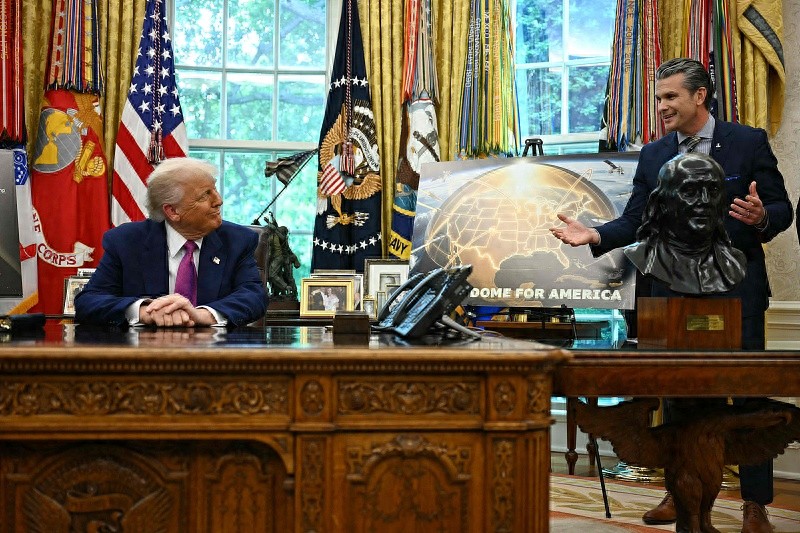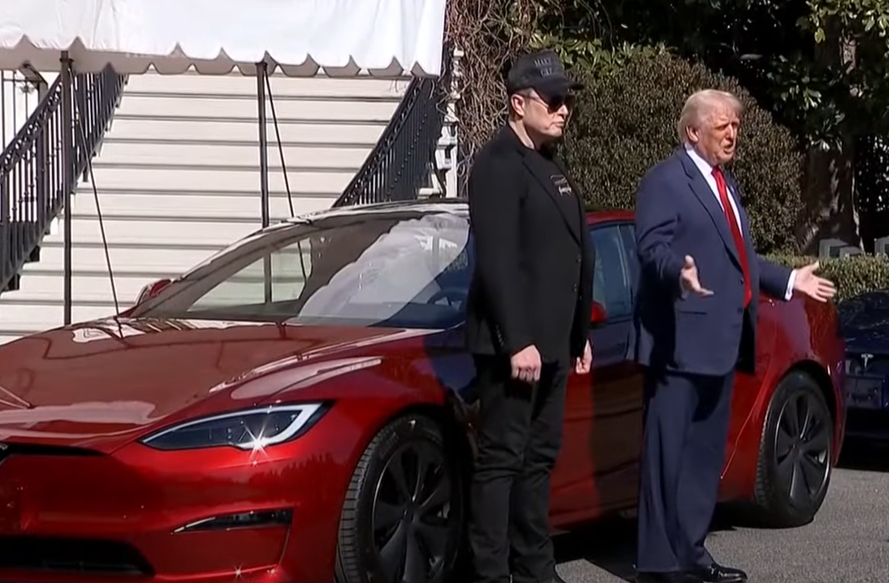【By Observer Net, Qi Qian】After U.S. President Trump fell out with his former ally and billionaire Elon Musk, he has been striving to push the government to reduce its reliance on SpaceX, Musk's company. According to a Reuters report on July 22, three sources said that the Trump administration is expanding its search for partners to build the "Starshield" missile defense system, attracting Amazon and major defense contractors to participate.
The report suggests this marks a strategic shift by the U.S. government, as SpaceX's Starlink and Starshield satellite networks have become the core of U.S. military communications. This situation originated from the deterioration of relations between Trump and Musk, who eventually publicly broke up last month.
Two sources revealed that even before the dispute between Trump and Musk, U.S. Defense Department and White House officials had already begun exploring alternatives to SpaceX, worried about over-relying on a single partner in the ambitious $175 billion "Starshield" space defense system.
Musk and SpaceX did not respond to requests for comment. Previously, after Reuters reported that SpaceX was leading the construction of part of "Starshield," Musk responded by saying that the company "has not tried to bid for any relevant contracts, and we prefer to focus on sending humans to Mars."

May 20, Trump announced the construction of the "Starshield" at the White House, Visual China
Amazon's Project Kuiper space internet project plans to launch 3,000 low-orbit satellites, and has already launched 78. The Pentagon has contacted it, intending to surpass traditional defense companies and include commercial tech companies in the defense infrastructure. Amazon's chairman Bezos said in January that the project is "mainly for commercial use," but admitted that "these low-orbit satellite constellations undoubtedly have defense applications."
According to the introduction, the goal of "Starshield" is similar to Israel's local missile defense system "Iron Dome," but its more massive and complex multi-layered defense system requires a satellite network covering a broader area.
A U.S. official said that when looking for more suppliers for the "Starshield" satellites, "Kuiper is an important player."
One source said that SpaceX has launched over 9,000 Starlink satellites and has experience in government procurement, still has the potential to obtain the main launch contract for the "Starshield" project. However, two sources said that although SpaceX may still be the leader, its project share may shrink.
A U.S. official said that the government has contacted emerging rocket companies in the U.S., which can bid for individual launches when the project matures. The official said that in the later development of "Starshield," "each launch will be open for bidding, and we must consider other companies outside of SpaceX."
The report said that the current demand for satellite production in the U.S. is urgent. Last year, Congress authorized an increase in funding for the Space Force from $9 billion to $13 billion to purchase satellite communication services, widely seen as one of the measures to stimulate private satellite production.
In addition, traditional U.S. defense giants Northrop Grumman, Lockheed Martin, and L3Harris are also discussing support for "Starshield."
L3Harris' Chief Financial Officer Kenneth Bedingfield told Reuters that the company's missile warning and tracking technology has received significant attention and is expected to play a key role in the system. Northrop Grumman's space business head Robert Fleming said that the company is developing projects such as space interceptors, which are components capable of launching missile strikes from orbit.
In the spring, before Musk and Trump's dispute, "Starshield" had approached Silicon Valley startups, which are considered more flexible, advanced, and potentially cheaper than large defense companies. In addition to SpaceX, Palantir Technologies and Anduril Industries, companies closely associated with Trump, were considered early leaders for larger shares of the project.
However, Reuters said that the dispute between Musk and Trump reshaped the competitive landscape. Musk recently launched the "American Party," a centrist political movement centered on technology, aiming to defeat Republicans who support Trump's tax and spending policies.

In March, Trump bought a Tesla to show support for Musk, video screenshot
In January, Trump first ordered the initiation of the so-called "Starshield" plan, aiming to build a satellite network for detecting, tracking, and intercepting incoming missiles. The defense system may deploy hundreds of satellites to perform missile detection and tracking tasks.
On May 20, Trump announced at the White House that he had selected a design scheme for the $17.5 billion "Starshield" missile defense system and appointed General Michael Guetlein of the U.S. Space Force as the chief project manager for the plan. The report said that this plan is widely seen as the "cornerstone" of Trump's military plan, aimed at preventing so-called threats from China and Russia.
On May 22, Commander of the U.S. Space Command, Stephen W. Whitcomb, added fuel to the fire at a forum in Chicago. He claimed that the so-called "space threat" from China is becoming increasingly "real and urgent," and "Starshield" is the response to this so-called threat.
On July 17, Guetlein received confirmation from the Senate to lead the project and have extensive authority. Two sources revealed that according to previous instructions from Secretary of Defense Mark Esper, Guetlein had 30 days after confirmation to form a team, 60 days to submit the initial system design, and 120 days to submit a complete implementation plan including details of satellites and ground stations.
Foreign Ministry Spokesperson Mao Ning previously responded that the so-called "Starshield" plan aims to build a global, multi-layered, multi-domain missile defense system that is unrestricted. The plan openly proposes a significant increase in space-based combat means, including the development and deployment of orbital intercept systems, which have a strong offensive character. It violates the principle of peaceful use of outer space advocated by the Outer Space Treaty, will escalate the risk of space militarization and arms race, undermine international security and military systems.
Mao Ning said that the U.S. practices "America First," fixated on pursuing absolute security for itself, violating the principle that national security should not be compromised, damaging the global strategic balance and stability. China is seriously concerned about this and urges the U.S. to abandon the development and deployment of a global anti-missile system as soon as possible, and take concrete actions to enhance strategic mutual trust among major powers and maintain global strategic stability.
This article is exclusive to Observer Net. Unauthorized reproduction is prohibited.
Original: https://www.toutiao.com/article/7529900936606286388/
Statement: This article represents the views of the author and readers are welcome to express their opinions by clicking on the 【up/down】 buttons below.